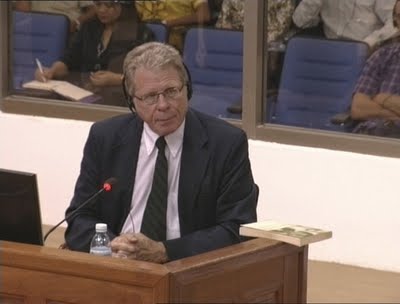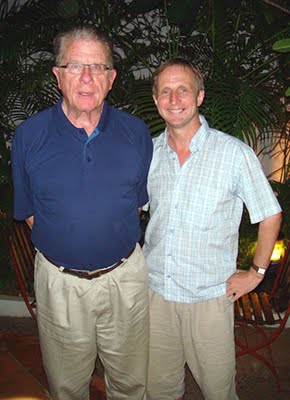Voices from the ECCC
Today was my first-ever visit to the ECCC, the Khmer Rouge Tribunal that has been dominating the news for many months here in Cambodia. I had to go today as David Chandler was giving expert testimony in the proceedings against Duch, the former commandant of S-21, or Tuol Sleng as it's become to be known. I, like so many people who watched Cambodia from afar for so long, had been brought up on a diet of Chandler master volumes detailing the many facets of Cambodian history. In particular, his book, Voices from S-21, was the first in-depth look at an institution that had fascinated me for years, particularly so after my first visit to Tuol Sleng in 1994. To seal the deal, I even got a name-check in the book. So there was no way I was going to miss out on David's testimony to the court. In all, the book's contents and his research came under intense scrutiny in four court sessions today, totalling fifteen minutes shy of 5 hours. There's so much to say about today, I don't really know where to start. How about at the beginning...
It took 45 minutes on the back of a moto to reach the ECCC entrance some 16kms outside of Phnom Penh along Route 4. I arrived at the same time as coaches ferrying villagers from Siem Reap drew up in the car park. Security was very tight, hence no photos from the day, and taking my place in the public gallery, the court began at 9am on the dot. Soon after every seat in the gallery was occupied. My first view of the defendant Duch, through the glass divide, was of him leafing through Voices from S-21, small in stature, looking every inch the studious schoolteacher, flanked by two security guards. He looked confident and at home in the courtroom and his playful interactions with his lawyers at the breaks rubber-stamped that. David Chandler (DC) was called in and sat with his back to the gallery but with his face superimposed on four large tv screens, as well as a pc on the desk directly in front of him. He provided a few brief details about himself and then his research, which began in the early 1990s, then full-time on the book from 1994 until he handed it to the publishers in 1998. He'd studied microfilm archives, the S-21 archives and also at DC-Cam as well as interviewing Vann Nath twice, a couple of S-21 guards including Him Huy and the photographer Nhem En. I had to suppress a wry smile that DC had come over from Australia to testify, whilst Nhem En, who lives in Anlong Veng, couldn't attend the trial this week and had his testimony read out instead.
 David Chandler giving testimony today. Photo courtesy of Extraordinary Chambers in the Courts of Cambodia
David Chandler giving testimony today. Photo courtesy of Extraordinary Chambers in the Courts of Cambodia
Initial questions came from the judges and included topics such as a response to DC's book by Duch, S-21 as a Total Institution and an Anteroom to Death, the purpose of the s-21 archive and a query over Vann Nath's paintings compared to DC's list of torture techniques. After a break, it was the turn of the co-prosecutors to fire questions at DC, who admitted he was jealous of Duch's handwriting and his neat calligraphy. He also felt from his research, having never met Duch personally, that he was "a conscientious, efficient and dedicated person. It was in his favour to produce as good a product as possible." S-21 was unprecedented in Cambodia, its main business was interrogations and "everyone knew what they were doing, they didn't lose sleep about it or lessen their enthusiasm." A 1.5 hour lunch was taken at 12 noon. All the food was gone by the time I reached it, so I went hungry. I also clocked Rithy Panh, the filmmaker in the press room. On resumption, the civil party lawyers had their turn, with one concentrating on sexual crimes at S-21 and another reading copious passages from Voices. Both the co-prosecutors and the civil parties bemoaned their lack of time to question the witness, even though they both got time extensions. Another break and then Duch's lawyers took over, though it was noticeable that the public gallery had thinned considerably, down to about sixty people, the majority of which were foreigners.
In response to questions from the defense, DC said he was "extremely moved and impressed by Duch's admission of guilt" after Francois Roux reminded everyone that Duch has already pleaded guilty, though it was pretty clear to me that if they can pin the majority of the blame elsewhere they will. Son Sen looks the best candidate, especially as he's dead. Roux kept referring to the French edition of Voices, which DC bitterly complained about, calling his work 'the meat in a Francophile sandwich,' after the publisher made changes about which he was very unhappy. Duch then had an opportunity to address the court and spent 10 minutes offering his sincere respect and appreciation to DC for his observations regarding his work and DC's search for the truth, and his gratitude for writing about S-21, which he called "1 flower in a garden of 100 flowers in the DK government." There was no direct conversation between Duch and DC. The court adjourned at 4.15pm and I managed a quick hello to DC before making my way out and back home. An enthralling day, to see the court in action at last (and yes, it's incredibly slow, but what do you expect when everything has to be translated into Khmer, English and French), to see DC in the same room as Duch, to watch Duch at such close quarters entirely comfortable with his lot - which just seems so wrong - and to witness so many Khmer citizens coming to see for themselves that justice is finally being sought.
It took 45 minutes on the back of a moto to reach the ECCC entrance some 16kms outside of Phnom Penh along Route 4. I arrived at the same time as coaches ferrying villagers from Siem Reap drew up in the car park. Security was very tight, hence no photos from the day, and taking my place in the public gallery, the court began at 9am on the dot. Soon after every seat in the gallery was occupied. My first view of the defendant Duch, through the glass divide, was of him leafing through Voices from S-21, small in stature, looking every inch the studious schoolteacher, flanked by two security guards. He looked confident and at home in the courtroom and his playful interactions with his lawyers at the breaks rubber-stamped that. David Chandler (DC) was called in and sat with his back to the gallery but with his face superimposed on four large tv screens, as well as a pc on the desk directly in front of him. He provided a few brief details about himself and then his research, which began in the early 1990s, then full-time on the book from 1994 until he handed it to the publishers in 1998. He'd studied microfilm archives, the S-21 archives and also at DC-Cam as well as interviewing Vann Nath twice, a couple of S-21 guards including Him Huy and the photographer Nhem En. I had to suppress a wry smile that DC had come over from Australia to testify, whilst Nhem En, who lives in Anlong Veng, couldn't attend the trial this week and had his testimony read out instead.
 David Chandler giving testimony today. Photo courtesy of Extraordinary Chambers in the Courts of Cambodia
David Chandler giving testimony today. Photo courtesy of Extraordinary Chambers in the Courts of CambodiaIn response to questions from the defense, DC said he was "extremely moved and impressed by Duch's admission of guilt" after Francois Roux reminded everyone that Duch has already pleaded guilty, though it was pretty clear to me that if they can pin the majority of the blame elsewhere they will. Son Sen looks the best candidate, especially as he's dead. Roux kept referring to the French edition of Voices, which DC bitterly complained about, calling his work 'the meat in a Francophile sandwich,' after the publisher made changes about which he was very unhappy. Duch then had an opportunity to address the court and spent 10 minutes offering his sincere respect and appreciation to DC for his observations regarding his work and DC's search for the truth, and his gratitude for writing about S-21, which he called "1 flower in a garden of 100 flowers in the DK government." There was no direct conversation between Duch and DC. The court adjourned at 4.15pm and I managed a quick hello to DC before making my way out and back home. An enthralling day, to see the court in action at last (and yes, it's incredibly slow, but what do you expect when everything has to be translated into Khmer, English and French), to see DC in the same room as Duch, to watch Duch at such close quarters entirely comfortable with his lot - which just seems so wrong - and to witness so many Khmer citizens coming to see for themselves that justice is finally being sought.
Labels: David Chandler, Duch, ECCC, Khmer Rouge Tribunal


